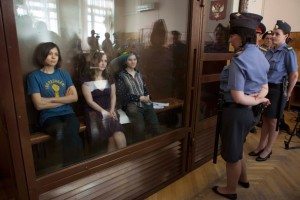Unless you’ve been living on Mars under one of those rocks that haven’t yet been upturned by the Curiosity Rover, you probably know that three members of an all-girl punk band called Pussy Riot are on trial in Russia this week for having performed a song critical of Russia’s dictator president Vladimir Putin. OK, so they sang their song “Punk Prayer” in a church, while wearing ski masks in high-fashion colors, and they prayed to  the Virgin Mary to have Putin removed from office. Well, wonder of wonders, Putin has no sense of humor, or maybe he just has no patience for people going around pointing out the absence of freedoms in Russia. I mean, even in the U.S. these days you can get yourself arrested and held indefinitely without warrant, charge or trial (in case you missed it, our president signed that one quietly into law last winter; a federal judge just declared the provision unconstitutional, but our government may nonetheless be continuing to use it as a basis for arrests). So we should be keeping a sharp eye on Russia, because certain Putin-style unfreedoms are starting to take root here as well. And you have to hand it to Pussy Riot: they really did get their clear, simple message across. What political statement could be more pure than praying to be liberated from an oppressive regime? The group’s three lead singers – Nadezhda Tolokonnikova, 22, Maria Alyokhina, 24, and Yekaterina Samutsevich, 29 – are also clearly intelligent political thinkers. Even after having been locked away for months in unreasonable detention, apparently under very poor conditions, all three of them managed to produce coherent, moving, incisive closing statements to be read out during their trial last week. And now you can read these statements on the website of the magazine n+1, which published them yesterday. I strongly encourage you to read them. I found the strength and intelligence of these young women profoundly inspiring. And then I started wondering how it was that we were able to read these statements so quickly, seeing as none of our major news organizations (with all their resources and staff translators) bothered to provide us with translations. And it turns out that this was a volunteer effort of the sort facilitated by the existence of social media. According to Katharine Holt, who was involved in the project as an editor, translator Bela Shayevich put out a call for collaborators to work on the project on Facebook last Thursday around 2:00 p.m.; and by midnight, Holt writes,
the Virgin Mary to have Putin removed from office. Well, wonder of wonders, Putin has no sense of humor, or maybe he just has no patience for people going around pointing out the absence of freedoms in Russia. I mean, even in the U.S. these days you can get yourself arrested and held indefinitely without warrant, charge or trial (in case you missed it, our president signed that one quietly into law last winter; a federal judge just declared the provision unconstitutional, but our government may nonetheless be continuing to use it as a basis for arrests). So we should be keeping a sharp eye on Russia, because certain Putin-style unfreedoms are starting to take root here as well. And you have to hand it to Pussy Riot: they really did get their clear, simple message across. What political statement could be more pure than praying to be liberated from an oppressive regime? The group’s three lead singers – Nadezhda Tolokonnikova, 22, Maria Alyokhina, 24, and Yekaterina Samutsevich, 29 – are also clearly intelligent political thinkers. Even after having been locked away for months in unreasonable detention, apparently under very poor conditions, all three of them managed to produce coherent, moving, incisive closing statements to be read out during their trial last week. And now you can read these statements on the website of the magazine n+1, which published them yesterday. I strongly encourage you to read them. I found the strength and intelligence of these young women profoundly inspiring. And then I started wondering how it was that we were able to read these statements so quickly, seeing as none of our major news organizations (with all their resources and staff translators) bothered to provide us with translations. And it turns out that this was a volunteer effort of the sort facilitated by the existence of social media. According to Katharine Holt, who was involved in the project as an editor, translator Bela Shayevich put out a call for collaborators to work on the project on Facebook last Thursday around 2:00 p.m.; and by midnight, Holt writes,
she had three translated statements that had been checked against the video of the closing statements and the original Russian copies of the statements (the hand-written statements had been posted by the radio station Ekho Moskvy, along with typed versions). In addition, all three had been edited by several native English speakers.
This is exactly the sort of group effort that made it possible to produce and edit Spanish-language translations of an entire issue of the Occupied Wall Street Journal in under two days last fall. Translators are as busy as everyone, but I am always astonished and heartened to see how quickly groups of us can band together around projects that seem urgent and important. And it was in fact crucial for word about Pussy Riot to get out quickly, since the three lead singers are scheduled to be sentenced this coming Friday. Statements of support have been pouring in from around the world, including from fellow musicians Franz Ferdinand, the Red Hot Chili Peppers, Patti Smith, Sting, Madonna and Bjork. Amnesty International is collecting signatures for letters of protest (please add your name!) to be sent to Russian Prosecutor General Yuri Yakovlevich Chaika, Moscow Central District Prosecutor Denis Gennadievich Popov, and Ambassador Sergey I. Kislyak. Friday will see events held in Pussy Riot’s honor in cities all over the planet. And at least one New York-based group, A New World in Our Hearts, is planning a solidarity rally in front of the Russian General Consulate at 10:00 a.m. on Friday morning, by which time the sentences will already have been read out in Moscow nine time zones away. Meanwhile, I am grateful to the members of the translating and editing collective who made it possible for me to read the statements by these brave young women who are speaking up for democracy so eloquently: the group Chto Delat (which had already published a version of one of the statements that was then edited by the n+1 team), Maria Corrigan, Ainsley Morse, Elena Glazov-Corrigan, Maksim Hanukai, Marijeta Bozovic, Sasha Senderovich, Liora Halperin, Vera Koshkina, Rebecca Pyatkevich, Katharine Holt, and Bela Shayevich. It makes me especially proud that some of these translators are current or recent students at Columbia University, where I will soon be teaching. And many of the translators and editors involved in the project provided thoughtful commentary on the importance of the three closing statements and the reasons why they personally felt moved to translate them. I am grateful to n+1 for publishing these short essays by the translators along with the statements of the imprisoned band members. We should all say our own prayers for their release on Friday.
Meanwhile, I am grateful to the members of the translating and editing collective who made it possible for me to read the statements by these brave young women who are speaking up for democracy so eloquently: the group Chto Delat (which had already published a version of one of the statements that was then edited by the n+1 team), Maria Corrigan, Ainsley Morse, Elena Glazov-Corrigan, Maksim Hanukai, Marijeta Bozovic, Sasha Senderovich, Liora Halperin, Vera Koshkina, Rebecca Pyatkevich, Katharine Holt, and Bela Shayevich. It makes me especially proud that some of these translators are current or recent students at Columbia University, where I will soon be teaching. And many of the translators and editors involved in the project provided thoughtful commentary on the importance of the three closing statements and the reasons why they personally felt moved to translate them. I am grateful to n+1 for publishing these short essays by the translators along with the statements of the imprisoned band members. We should all say our own prayers for their release on Friday.


Thank you very much for posting this & the link to their translated statements.
May all be well,
Alexander Booth